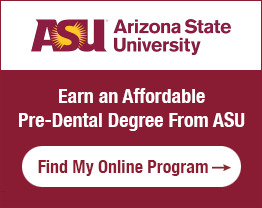According to the Delaware Department of Labor, there were 625 dental hygienists employed in the state in 2012; by 2013, this number had increased to 667. By 2015, the Department of Labor projects there will be 693 dental hygienists and 711 in 2022. This steady increase in dental hygienist jobs in Delaware equates to about 27 annual openings every year.
The State of Delaware Board of Dentistry and Dental Hygiene licenses dental hygienists in Delaware. Dental hygienists are responsible for conducting patient assessments, teaching patients proper oral hygiene, and conducting oral inspections and teeth cleanings under the supervision of licensed dentists.
Featured Programs:
- Online
- Online
To become a licensed dental hygienist in Delaware, you must be prepared to complete a number of necessary steps:
Step 1. Graduate from a Program of Dental Hygiene Approved by the Board
Licensure as a dental hygienist in Delaware requires you to successfully complete a program of dental hygiene that is accredited by the Commission on Dental Accreditation (CODA) and is at least two years in length.
A two-year program in dental hygiene that is accredited by CODA will result in an associate degree, which may be structured as an Associate of Science (A.S.), Associate of Arts (A.A.), or an Associate in Applied Science (A.A.S.). The American Dental Hygienists Association also recognizes a bachelor’s degree as an entry-level program for licensure of dental hygienists; therefore, it is common to see both associate and bachelor degree programs in dental hygiene.
Although there is only 1 CODA-accredited dental hygiene program in Delaware, there are 6 programs in neighboring New Jersey and another 7 programs in Maryland. Further, a number of online institutions now have CODA-accredited dental hygiene programs, which offer distance learning opportunities.
Step 2. Successfully Pass the National Dental Hygiene Board Examination
Once you have successfully completed a CODA-accredited dental hygiene program, you may work toward licensure by taking and passing the National Board Dental Hygiene Examination (NBDHE) through the Joint Commission on National Dental Examinations.
Note: The Board does not taking the National Dental Hygiene Board Examination before the Delaware state practical examination. Candidates may choose to complete either examination first.
The National Dental Hygiene Board Examination is recognized in all U.S. jurisdictions as a component for licensure, and its purpose is to determine the qualifications of dental hygienists practicing in the U.S. The examination consists of two components and 350 questions.
You must apply to take the exam through JCNDE and take the exam through one of the Pearson VUE testing centers located in the U.S. In Delaware, there are Pearson VUE testing centers located in Dover and Newark, as well as nearby Atlantic City, New Jersey and Baltimore and Salisbury, Maryland.
Step 3. Successfully Pass the Delaware Practical Board Examination
Unlike other states that utilize regional practical examinations, Delaware dental hygiene candidates must take and pass the Delaware Practical Board Examination in Dental Hygiene.
The Practical Board Examination is offered twice a year, in January and May. The deadline to take the January examination is December 1, and the deadline to take the May exam is April 1. Only 36 candidates may take the examination on each date; therefore, the Board urges all candidates to submit their applications before the deadline for the examination they want to sit for. You can learn more about the Practical Board Examination for Dental Hygienists here.
Before you can sit for the Delaware Practical Board Examination, you must submit the following documentation to the Board:
- A completed, signed, and notarized Application for Dental Hygienist Licensure before your examination deadline
- An official transcript showing the completion of a Board-approved dental hygiene program (must be sent directly from the school to the Board office)
- The $66 processing fee and $100 examination fee (made payable to the State of Delaware)
- A copy of your CPR certification card
- Your official high school transcript (or copy of your GED certificate)
Step 4. Successfully Pass the Delaware Jurisprudence Examination
All applicants for dental hygienist licensure must take and pass the Delaware Jurisprudence Examination, a written examination that includes 20 multiple-choice questions that are based on Delaware license law and Board rules and regulations.
You can contact the Board at 302-744-4500 or at [email protected] with questions regarding taking the jurisprudence examination.
Step 5. Provide Required Documentation to the Board for Licensure
After you passed the Delaware Practical Board Examination, you must provide the Board with the following documentation to be considered for licensure as a dental hygienist in Delaware:
- National Dental Hygiene Board Examination score report (sent directly from the JCNDE
- The Jurisprudence Examination for Dental Hygienist Candidates (must be signed and notarized)
- Criminal History Record Check Authorization form (follow instructions on the authorization form to arrange for fingerprinting)
- A letter of reference attesting to your good moral character and reputation
Step 6. Keep your Dental Hygienist License Current
Your dental hygienist license expires on May 31 of even-numbered years, and you must complete at least 24 hours of continuing education to renew your license. If your dental hygienist license is less than two years old at the time of your first renewal, your continuing education requirements will be prorated.
To keep your dental hygienist license current in Delaware, you must complete at least 2 hours of continuing education in a course covering infection control, and you must maintain CPR certification.
You can find a list of approved continuing education providers here.








